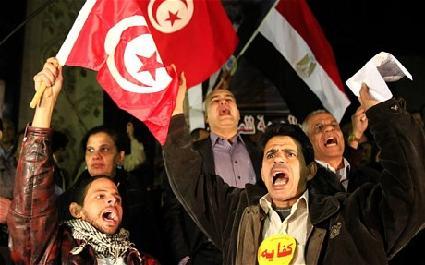A recent op-ed in Foreign Policy discusses the possibility of the Muslim Brotherhood in Egypt becoming more ‘Islamist’ as time goes on as they seemingly increase their power in government but notes a slight difference between Egypt’s transition and Tunisia’s:
In Tunisia, the Islamist Ennahda movement quickly found that, despite a landslide election victory in 2011, secular parties and a vibrant civil society would resist any attempts at “Islamization,” particularly when it came to writing the country’s new constitution...Ennahda decided to withdraw several proposed clauses, including one that would enshrine sharia as a “source among sources” of legislation…Tunisia…is generally seen as the closest thing the Arab Spring had to a success story. One reason is that Tunisia — unlike Egypt — has been able to take its time. The drafting of Tunisia’s new constitution has been a slow…process. But slowness is the price of consensus. Once the process is completed, Tunisians will be able to point to a constitutional document that enjoys broad support across the political and ideological spectrum.(Emphasis added)
New democracies but what government awaits?
The author warns that some believe Tunisia will still be debating how much “Islamization” is allowed for some time to come but there seems to be a more tolerant tone in the country than in Egypt. What might explain this more moderate process when debating the infusion of religious values in their new governments? The answer could be education.
If we look at some of the rankings where education is a key factor, we see Tunisia ranks higher (albeit somewhat slightly) than Egypt in education index, human development index, and school leaving age. Comparing the two at Nation Master also shows Tunisia better in nearly every education category given.
The debate over level of education versus level of religiosity goes back and forth at times but the more important factor possibly playing a role here is religious tolerance. As noted in this polling data from Gallup a decade ago:
education level correlates positively with the likelihood to be tolerant of other faiths, even if they don’t actively seek to understand them.
But the most interesting and, maybe, the most relevant info to this case is in this article of polling data from Gallup. It finds:
even though they do not belong in as great a number or attend as frequently as their more highly educated counterparts, those on the lower end of the educational scale have much more faith in religious institutions, perhaps reflecting a broader tendency to rely on institutions in other areas of their lives — unions, HMOs, government agencies, etc. Those in this group have far less faith in the individuals at the head of their religious institutions — the clergy — than in the institutions themselves.
This reality coupled with the tolerance data suggests more education leads to a more active push from people of their direct leaders for what they want instead of a more passive faith in them. In other words, the people in the institutions are forced to be more responsive to their better educated constituents because they tend to be more active and vocal. And this verbalizing may tend to more tolerance of other religions and skepticism of religious implementation in government, as seen in Tunisia, while lower education levels may tend to more passivity and more allowance of religious fervor in government, as seen in Egypt.
There is still a long way to go before things have settled in both of these countries and their governments could take paths to either more “Islamization” or more secularization in the years to come. Only time will tell. But there certainly seems to be, at the very least, a more gradual and more moderate movement toward creating a new government in Tunisia while Egypt continues its apparently more conservative path with increasing inner turmoil still disrupting the country on a regular basis.


